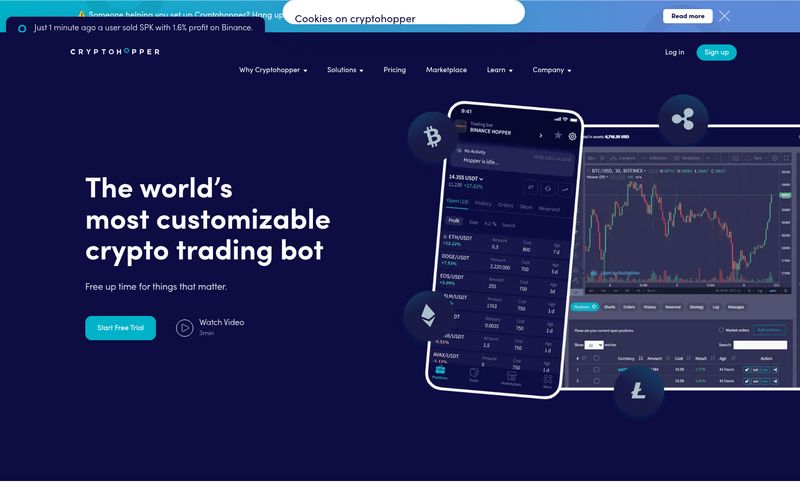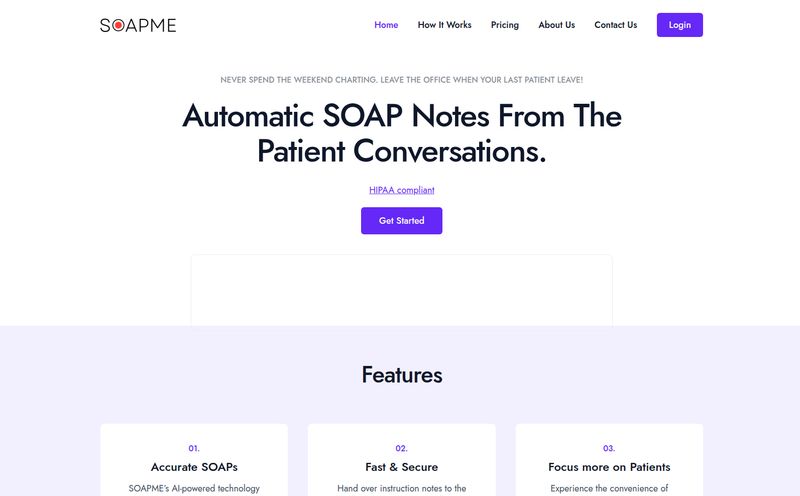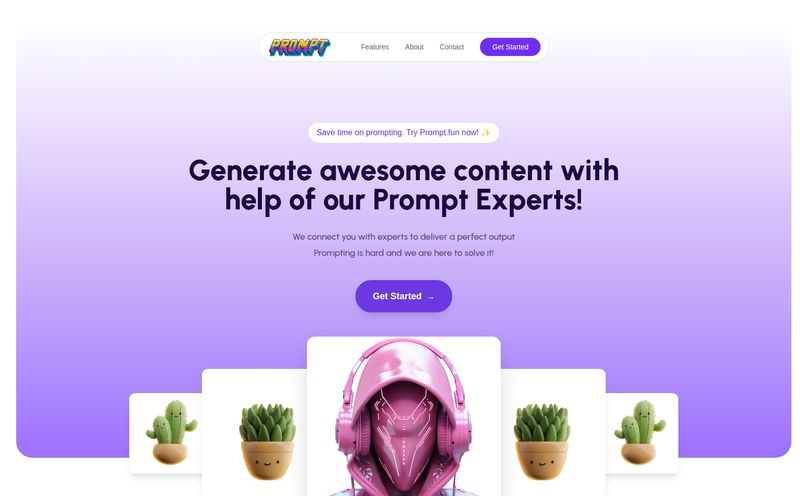How many articles, YouTube tutorials, or insightful Twitter threads have you saved with the absolute best of intentions, only to have them disappear into the digital abyss of your 'Read Later' list? My Pocket account is a graveyard of good intentions. We consume so much information every single day, but our brains are like leaky buckets. Most of it just… drips out. It's frustrating, right? You spend hours learning something, and a week later, you can barely recall the main points.
For years, I've been on a quest for the perfect system. I've tried intricate Notion databases, complex tagging systems in Evernote, you name it. They all help with storing information, but they don't do much to help you remember it. So when I stumbled upon a new tool called Mistral, my curiosity was definitely piqued. It claims to be a “learning and retention platform,” which sounds a whole lot more active than just a digital filing cabinet.
So What Is Mistral, Exactly?
At its core, Mistral isn't just another note-taking app. It's designed to be a bridge between learning something and actually being able to use that knowledge in the real world. Think of it less like a library and more like a personal librarian who doubles as your cognitive coach. The whole point is to turn passive consumption into active knowledge that sticks.
And here’s the kicker, the thing that made me sit up and pay attention: it’s supported by the National Science Foundation (NSF). That’s not a stamp of approval you see every day on a productivity app. The NSF doesn’t just hand out grants for flashy software; they back scientifically-grounded projects. This tells me there’s some serious cognitive science behind Mistral's approach, not just marketing fluff. It suggests a focus on proven methods for learning, which is a breath of fresh air.

Visit Mistral
Breaking Down the Mistral Features
Okay, so it has a fancy benefactor. But what does it actually do? From what I've gathered, its power comes from a few key areas that work together to stop that leaky bucket syndrome.
Your Smart Knowledge Hub
First off, it’s a central place for all your learning resources. You can pull in articles, PDFs, videos, and more. This is the resource management and knowledge management part. Standard stuff for many platforms, but here it’s the foundation. It’s about getting everything into one place so the real magic can happen. No more hunting through five different apps to find that one video you watched three months ago.
An AI Assistant That Actually Helps You Learn
Mistral comes with an AI Reading Assistant and a summarization feature. I know, I know, every tool has AI now. But here, the goal isn't just to give you a short summary so you can skip the reading. It’s about creating a concise version that you can use for review. The AI helps you distill the core ideas, which is the first step in the learning process. It’s like having a research assistant who preps your study notes for you.
The Secret Sauce: Built-in Learning Techniques
This is the part that excites me most. Mistral supposedly incorporates proven learning techniques directly into the workflow. While the specifics aren't fully detailed yet, this usually means things like active recall and spaced repetition. Instead of just re-reading your notes (a horribly inefficient way to learn), the platform will likely prompt you to recall information at specific, increasing intervals. This is how you move knowledge from short-term to long-term memory. It’s the difference between cramming for a test and actually understanding a subject. I'm really keen to see how they've implemented this, it could be a game-changer.
A Quiet Place to Think
They also tout a “Distraction-Free Reading” environment. This might sound like a small feature, but in a world of pop-ups, notifications, and a million open tabs, having a serene space to focus is invaluable. It’s a simple feature that shows they understand the modern learner’s biggest enemy: the endlessly distracting internet.
The Good, The Bad, and The... 404 Not Found
No tool is perfect, especially one that's this new. So, in the spirit of full transparency, let's talk about the pros, the cons, and the slightly weird stuff I found.
On the plus side, the concept is fantastic. A platform focused on retention, not just collection, and backed by the NSF? Sign me up. The promise of integrating with tools I already use is also a huge win. The last thing I want is another siloed system.
But here's the thing. Mistral isn't quite ready for public access yet. It's still in its early stages. When I went to check out their site for more details and to find a pricing page… well, I was greeted by a friendly '404 Not Found' error. A classic sign of a product still in the oven, you know? It’s a bit mysterious, a bit under wraps.
This leads to the other points of consideration. There's talk of a lifetime access offer, which always gets my attention. But it's apparently limited to the first 100 customers. So it's one of those blink-and-you'll-miss-it deals. On top of that, the 30-day money-back guarantee is a little quirky—it only kicks in after the app officially goes live. It's a bit of a weird one, that guarantee is. It requires a certain leap of faith from early adopters.
What's the Deal with Pricing?
Because the main site seems to be under construction, there's no public pricing page to link to. All the chatter points towards that very exclusive Lifetime Deal (LTD) for the first 100 people. This is a common strategy for new SaaS products to get initial funding and a core group of beta testers.
What does this mean for you? If you can find the offer, it’s a high-risk, high-reward situation. You’re betting on the future of the platform. Given the NSF backing and the solid concept, it might be a bet worth taking for some. For others, it’s probably better to wait until it’s fully launched and has a standard monthly or annual subscription model. I, for one, am keeping a close eye on it.
Who Is Mistral Built For?
I can see this being incredibly useful for a few groups of people:
- Students: Obviously. A tool designed to make studying more effective and permanent? It's a no-brainer.
- Professionals & Lifelong Learners: This is me. If your job requires you to constantly learn new skills—like SEO, coding, marketing, or law—this could be a massive advantage. It helps you stay on top of industry trends and actually retain what you learn from webinars and articles.
- Content Creators & Writers: Anyone who does a lot of research can use Mistral to build a personal knowledge base that they can actually draw from, rather than just a folder full of bookmarks.
My Final Thoughts on Mistral
Mistral is ambitious. It's trying to solve a genuine problem that affects almost every knowledge worker in the modern world. The approach seems sound, the features are well-thought-out, and the backing from the National Science Foundation gives it a ton of credibility.
Yes, it's still a bit of a mystery. It's not publicly available yet, and the early offers require a bit of a gamble. But I'm optimistic. We don't need another note-taking app. We need a thinking partner. We need a tool that respects the limits of our memory and helps us augment it. Mistral might just be that tool. I’ll be refreshing that 404 page, waiting to see what they've built once the doors are finally open.
Frequently Asked Questions
What is Mistral in simple terms?
Mistral is a software platform designed to help you not just save information, but actually learn and remember it for long-term use. It combines resource management with an AI assistant and proven learning science principles.
How is Mistral different from Notion or Evernote?
While Notion and Evernote are great for organizing and storing information (like a digital filing cabinet), Mistral's primary focus is on knowledge retention. It actively helps you learn the material you save using built-in techniques, which is something most note-taking apps don't do.
Is Mistral available to the public right now?
As of this writing, Mistral does not appear to be fully public yet. It seems to be in an early access or pre-launch phase, with offers available to a limited number of early adopters.
What does it mean that Mistral is supported by the NSF?
The National Science Foundation (NSF) is an independent agency of the U.S. government that supports fundamental research and education. Their backing suggests that Mistral's methodology is based on credible scientific research into learning and cognition, lending the tool a high degree of authority.
What kind of learning techniques does Mistral use?
While not explicitly detailed yet, the platform is built around proven techniques for memory retention. This likely includes methods like spaced repetition (reviewing information at increasing intervals) and active recall (prompting you to remember information from scratch), which are scientifically proven to be more effective than passive re-reading.
Is the Mistral lifetime deal a good investment?
That depends on your risk tolerance. Investing in a lifetime deal (LTD) for a pre-launch product is always a gamble. However, the strong concept and NSF support make Mistral a more promising bet than many other LTDs on the market. It's best for those who are passionate about the problem it solves and are willing to be early testers.
Reference and Sources
The information for this article was based on early-access product descriptions and promotional materials. Attempts to access the main product and pricing pages were unsuccessful as the site appears to be in a pre-launch phase.



